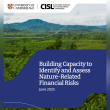The Well Done Foundation (WDF), a nonprofit focused on reducing methane emissions from orphaned oil and gas wells, has entered into a strategic partnership with The Carbon Sink (TCS), a climate finance and carbon management firm, to scale up the delivery of carbon credits tied to well-plugging efforts across the United States.
The collaboration aims to bring verifiable and traceable carbon credits to the market, generated through the permanent closure of methane-leaking wells—often described as “super-emitters” due to their potent greenhouse gas output. Methane, which is significantly more damaging to the climate than carbon dioxide, is a key target in global efforts to limit temperature rise.
Each sealed well can prevent the release of up to 4,000 tonnes of CO₂ equivalent annually. The process not only reduces harmful emissions but also eliminates local environmental and safety risks posed by these abandoned sites.
“This partnership with The Carbon Sink is a game-changer for the Well Done Foundation,” said Curtis Shuck, Founder and Chairman of WDF. “It directly addresses the urgent need to plug these environmental hazards while creating a sustainable funding mechanism. Our mission is to plug every orphan well across the globe that poses a threat to communities.”
The Carbon Sink will help connect companies seeking credible carbon offsets with credits from WDF’s projects, offering a route for firms to align climate goals with measurable impact. According to Sebastian Fragni, Founder and Executive Director of The Carbon Sink, “Companies are increasingly seeking authentic and transparent ways to meet their climate goals, and the methane abatement from orphan well plugging provides exactly that.”
The partnership is positioned to support expansion beyond the United States, responding to the growing global demand for high-integrity carbon credits and scalable methane reduction solutions.














